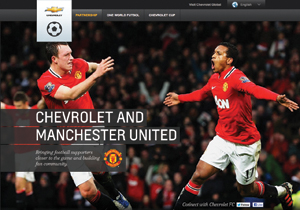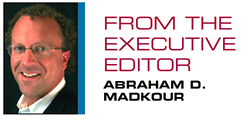One story we’ve covered in SportsBusiness Daily but haven’t given enough mention of in SportsBusiness Journal is the sponsorship deal that General Motors signed with Manchester United earlier this month. The announcement came days after GM said it was forgoing advertising on CBS’s broadcast of Super Bowl XLVII.
The deal’s architect, GM Global CMO Joel Ewanick, is a true believer in the power of sports as an advertising platform, and he was credited by many on the sales side as being one of the key forces that brought big auto back to the domestic sports ad marketplace during the recession. So for him to move some of his marketing dollars from a U.S. mainstay to a U.K.-based — but global — property is significant. There is obviously a play for the Asian market, and in announcing the deal in Shanghai, GM said it plans to create the Chevrolet China Cup that will feature ManU exhibition games in many Chinese cities.
 |
Executives say U.S.-based companies and properties can learn from GM’s move to go global in its sponsorship.
|
But what’s the broad significance of the deal or key takeaways? Four executives who understand the global market but also have keen intuition about soccer (as well as being diehard Premier League fans) noted a company recognizing the worldwide reach of the sport and the Premier League.
“It’s a huge deal,” said Darren Marshall, executive vice president of consulting and research at rEvolution and himself a diehard Arsenal fan. “A few U.S. companies in consumer packaged goods have been aware of the power of global soccer for a long time — Coke, Gillette’s long-term investment in World Cup. But this marks the first time a sponsor from autos — one of the largest advertising sectors in America — has driven a global deal with a foreign soccer club from its U.S. headquarters.”
Mark Noonan, president of Connecticut-based sports consultancy FocalSport and former executive vice president of MLS and CMO of U.S. Soccer, also credited GM with looking outside its U.S. base. “An iconic American brand is waking up to the fact that the world is getting smaller and soccer is the universal language — outside of this country,” said Noonan, also a longtime Arsenal fan. “It’s clear that with this deal, Chevrolet is looking well beyond Detroit and the U.S. for its growth.”
He said one shouldn’t overlook where GM announced its deal, signaling a key area for the brand’s activation. “They have some key markets in mind when doing this deal, especially when you notice they made the announcement in China and are developing a tournament with Manchester United in China,” he said. “Almost half of Manchester United’s 650-million-plus fans are based in Asia. So it makes sense to focus on this major market where there is such a developed fan base.”
Danny Townsend, who has lived all over the world in helping to build the brand analysis consultancy Repucom International, believes the deal fully complements what GM is doing already in the U.K. with its Vauxhall brand’s sponsorship of the home nations (England, Scotland, Wales and Northern Ireland football associations). “The fact that GM has now this deal for its Chevrolet brand strengthens their commitment to football and positions themselves around the world as a brand well aligned with football fans,” said the rabid Fulham follower.
Simon Wardle, Octagon Worldwide’s chief strategy officer and who has researched the global marketplace for years, said, “It’s significant in the sense that it serves notice that traditional American brands like GM now recognize that Manchester United and the major EPL teams are global properties.”
But should U.S. sports entities be concerned that they aren’t delivering proper value when such a recognized U.S. brand goes global? Noonan didn’t see it that way, saying, “It’s more about Chevy’s ambition about being a global player outside the U.S. more than it reflects anything on the U.S. sports.”
Wardle, a mad supporter of West Bromwich Albion, sees GM’s decisions independently. “Super Bowl advertising delivers 100-plus million U.S. viewers on one day. The ManU deal potentially aggregates that many global viewers every week for nine-plus months of the year,” he said. “But I am not sure that you can make any connection to this sending a signal to U.S. sports, other than to remind them that they do not have as big a global footprint as the EPL.”
As someone who consults with a number of corporate brands, Marshall thinks U.S.-based companies should take notice of the broad reach of the deal and focus less on the U.K. base of the United. “This is a truly global deal and sends a signal to U.S.-based brands that they need to wake up and realize what their Asian competitors have long realized — soccer clubs can be truly powerful global marketing platforms,” he said. He offered an internal example to prove the worldwide returns to a deal like this, “When we measure ROI for Chelsea for Samsung, only a fraction of value comes from the U.K. itself.”
The takeaway — and lesson for U.S. sports — is simple for Townsend. Don’t underestimate the power of the Premier League, and learn from it. “To me, it really demonstrates the strength of the Premier League as an international media proposition,” he said from London. “It’s all about distribution and positioning yourself as an international sports proposition, and that is what the U.S. leagues should learn from this deal. Many of the leagues, the NBA and MLB, for example, have significant international broadcast platforms, but given their scale domestically, they often downplay their international proposition. I think if the U.S. sports better understood their international proposition and communicated that as a valuable asset to potential global brands, they too would represent an interesting opportunity.”
Abraham D. Madkour can be reached at amadkour@sportsbusinessjournal.com.





